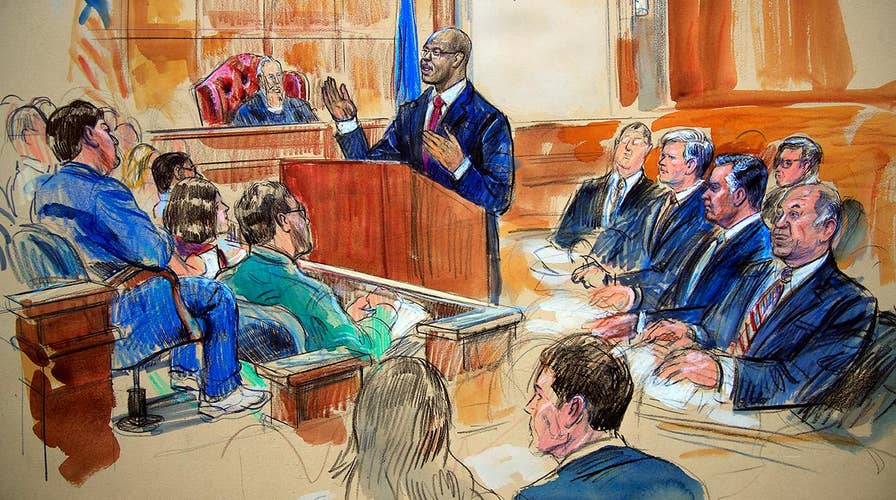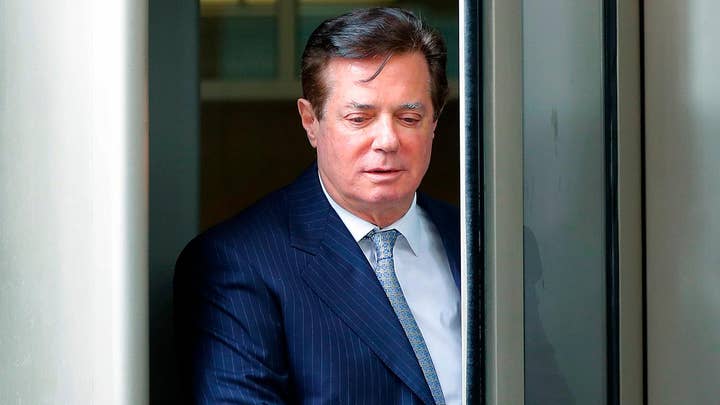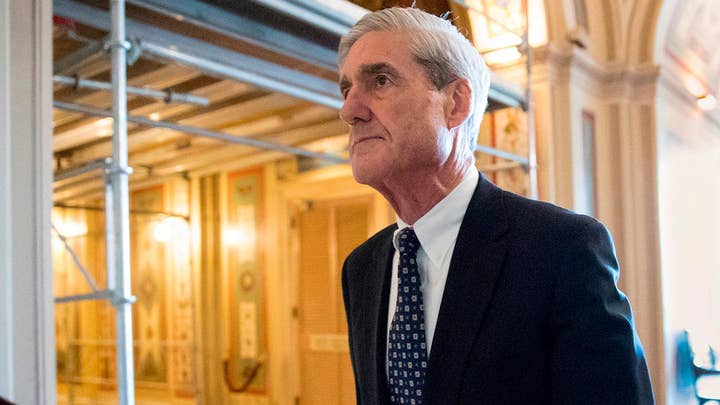Mueller team lectured by judge in day 2 of Manafort trial
Prosecutors to stop using the word 'oligarch' to describe wealthy Ukrainians who dealt with Manafort.
The federal judge presiding over the fraud trial of ex-Trump campaign chairman Paul Manafort rebuked Special Counsel Robert Mueller's team repeatedly on Wednesday, highlighting potential vulnerabilities in the first prosecution arising out of Mueller's ongoing Russia probe.
The 78-year-old Reagan-appointed judge, T.S. Ellis, sent jurors out of the courtroom several times as he reminded prosecutors that Manafort is not on trial for simply having a "lavish lifestyle."
Ellis also surprised the courtroom late Wednesday when he said, "I’m hoping to finish this case much sooner than anyone predicted.”
The trial had been expected to last three weeks. Earlier in the day, prosecutors told the judge they thought the government could wrap its case by the end of next week.
Prosecutors have introduced a bevy of exhibits and are in the process of calling several witnesses as part of their effort to paint Manafort as a tax scofflaw who failed to report money spent on luxury items -- then lied to get bank loans when his foreign consulting work dried up.
But the Mueller team was rebuffed by Ellis when it tried to introduce photos of Manafort’s closets, filled with suits and other high-end articles of clothing. Ellis noted that those photos would eventually become fodder for the media, and called them "unnecessary" for jurors to see.
“Enough is enough. We don’t convict people because they have a lot of money and throw it around,” he said.
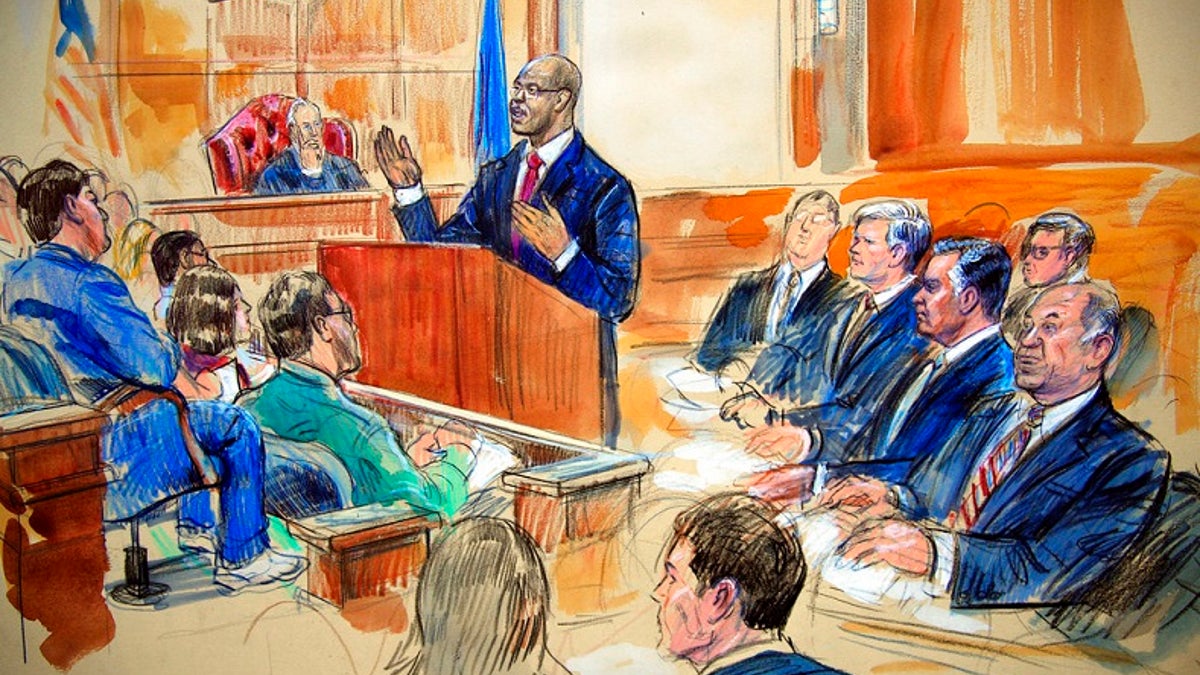
This courtroom sketch depicts Paul Manafort, seated right row second from right, together with his lawyers, the jury, seated left, and the U.S. District Court Judge T.S. Ellis III, back center, listening to Assistant U.S. Attorney Uzo Asonye, standing, during opening arguments in the trial of President Donald Trump's former campaign chairman Manafort's on tax evasion and bank fraud charges. (AP)
He also dismissed an exhibit related to Manafort's lavish spending: "All this document shows is that Mr. Manafort had a lavish lifestyle," Ellis said. "It isn't relevant."
The legal standard for excluding evidence based on irrelevance or the risk of prejudicing jurors is high -- ordinarily, judges only prevent jurors from seeing evidence that has no tendency to make any fact at issue in the case more or less likely, or that would pose a substantial risk of unfairly arousing juror bias.
The prosecution was able to present some evidence of Manafort's spending on Wednesday. One witness, Ron Wall, the chief financial officer of high-end men's apparel store House of Bijan in Beverly Hills, Calif., testified that Manafort spent a grand total of $334,325 over a three-year period at the store.
That included one invoice for an assortment of clothing in 2010, at a total of roughly $128,000. Wall testified that most of those payments came from wire transfers from banks in Cyprus -- but he admitted on cross-examination by defense attorneys that he has other clients who similarly use wire transfers for costly items.
Another witness, Steve Jacobson, a contractor hired by Manafort from 2010 to 2014, said he worked on a number of the defendant's properties, including one in Trump Tower. That is the first time jurors heard Trump's name uttered in the trial.
Jacobson said most of the nearly $3.3 million Manafort paid him in that period came by way of international wire transfers. The parties also stipulated that a payment for daughter Andrea’s house in Arlington came in the form of a $1.9 million wire transfer from a Cyprus bank.
Among his other rebukes, Ellis on Wednesday told prosecutors to stop using the word “oligarch” to describe wealthy Ukrainians, whose dealings with Manafort are at the heart of the fraud charges he faces in the northern Virginia federal court. He said the term is a "pejorative" that would risk unfairly prejudicing jurors against Manafort.
More witnesses are scheduled in the case, who appear ready to testify about Manafort's spending habits. Ellis' decisionmaking casts into doubt how much of that testimony will be heard by jurors, or what instructions jurors will get on how to consider this testimony.
DAY ONE TRIAL RECAP: PROSECUTION CALLS FIRST WITNESS, WHO PRAISES MANAFORT'S WORK ETHIC
In a surprising moment, prosecutor Uzo Asonye told Ellis that Rick Gates -- Manafort's former business partner who had been considered a potential star witness for the prosecution -- might not be called to the stand after all.
"Enough is enough. We don’t convict people because they have a lot of money and throw it around."
"He may testify, he may not," Asonye informed Ellis, saying Mueller's team would make the call depending on the evidence presented.
That disclosure prompted reporters to hustle out of the courtroom to report the news -- "scurry[ing] out of here like rats out of a sinking ship," Ellis said.
“You know who you are going to call,” Ellis sharply told Asonye. “If you are going to call him, then this [debate over a particular exhibit] is a waste of time.”
During opening arguments Tuesday, the defense team made it clear they intend to blame Gates, who handled some day-to-day business operations for Manafort, for many of the alleged reporting deficiencies Manafort is charged with.
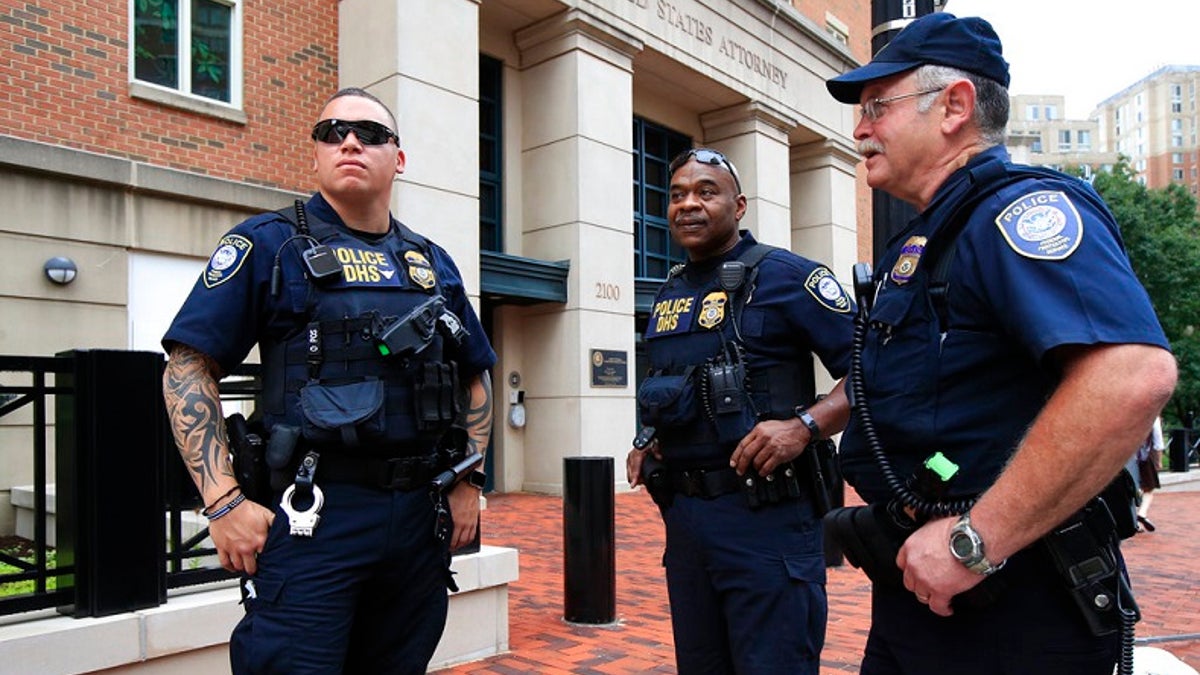
DHS guards stand watch on Tuesday outside the federal courthouse in Alexandria, Va. (AP)
Ellis interjected during the prosecutors' opening statement to remind jurors that wealth alone is not criminal, and he rebuked a prosecutor in front of the jury for saying that the "evidence will show" Manafort's guilt.
"It isn't a crime to have a lot of money and be profligate in your spending," Ellis said.
Jurors also heard Tuesday that Manafort bought an ostrich jacket worth more than $15,000. That prompted Ingrid Newkirk, president of People for the Ethical Treatment of Animals (PETA), to issue a statement calling for Manafort to turn over the jacket, which was "likely made from numerous juvenile ostriches whose throats were slit and whose feathers were plucked out."
Ellis had harshly admonished members of Mueller's team in a tense preliminary hearing in May, saying they "don't care" about Manafort and were pursuing the case against the 69-year-old ex-Trump adviser only as a means of targeting the president.
Ellis has issued tough -- sometimes colorful -- statements and rulings against the defense during the Manafort case, as well.
He interrupted a defense attorney who was outlining to the jury Manafort's efforts to improve American international political outreach, asking, “I take it you plan to offer evidence?” and prompting the attorney to offer some.
Ellis, who took senior status more than a decade ago but continues to hear a limited docket, also seemed to grow impatient on Tuesday after being told that attorneys on both sides were seen rolling their eyes in response to his rulings or after stepping back from the bench.
ELLIS ACCUSES MUELLER TEAM OF TRYING TO USE MANAFORT PROSECUTION TO GET TO TRUMP
The lawyers' facial expressions, Ellis said, appeared to show them thinking, "Why do we have to put up with this idiot judge?"
Earlier this month, Ellis denied a defense motion to move the trial further from Washington, D.C., rejecting Manafort's argument that media coverage in the major market would risk biasing the jury.
"The mere fact that a case has drawn substantial media attention does not, by itself, warrant a change in venue," Ellis wrote in denying the request.
Separately, Ellis also excoriated the defense team earlier this month for opposing Manafort's transfer to an Alexandria, Va., jail -- shortly after complaining that the jail at which he was housed was also inadequate.
"Defense counsel has not identified any general or specific threat to defendant’s safety at the Alexandria Detention Center," Ellis wrote. "They have not done so, because the professionals at the Alexandria Detention Center are very familiar with housing high-profile defendants including foreign and domestic terrorists, spies and traitors."
He continued, "It is surprising and confusing when counsel identifies a problem and then opposes the most logical solution to that problem."
The Associated Press contributed to this report.








































